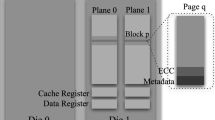Abstract
We propose a efficient writeback scheme that enables guaranteeing throughput in high-performance storage systems. The proposed scheme, called de-fragmented writeback (DFW), reduces positioning time of storage devices in writing workloads, and thus enables fast writeback in storage systems. We consider both of storage media in designing DFW scheme; traditional rotating disk and emerging solid-state disks. First, sorting and filling holes methods are used for rotating disk media for the higher throughput. The scheme converts fragmented data blocks into sequential ones so that it reduces the number of write requests and unnecessary disk-head movements. Second, flash block aware clustering-based writeback scheme is used for solid-state disks considering the characteristics of flash memory. The experimental results show that our schemes guarantee system’s high throughput while guaranteeing data reliability.

















Similar content being viewed by others
References
Lim S-H, Choi HJ, Park JH (2011) Efficient de-fragmented writeback for journaling file systems. In: International conference on secure and trust computing, data management, and applications
Smith KA, Seltzer MI (1997) File system aging–increasing the relevance of file system benchmarks. Measurement and modeling systems, pp 203–213
Bovet DP, Cesati M (2005) Understanding the Linux Kernel, 3rd edn. O’Reilly & Associate, Sebastopol, pp 767–774
Baek SH, Park KH (2007) Matrix-stripe-cache-based contiguity transform for fragmented writes in RAID-5. IEEE Trans Comput 56(8)
Tweedie S (1998) Journaling the Linux ext2fs filesystem. In: LinuxExpo’98
Reiser H (2007) ReiserFS. http://www.namesys.com
Sweeney A, Doucette D, Hu W, Anderson C, Nishimoto M, Peck G (1996) Scalability in the XFS file system. In: Proceedings of the USENIX annual technical conference
Best S, Gordon D, Haddad I (2003) IBM’s journaled filesystem. Linux J. http://www.linuxjournal.com/article/6268
Rosenblum M, Ousterhout J (1992) The design and implementation of a log-structured file system. ACM Trans Comput Syst 10(1):26–52
Seltzer M, Bostic K, McKusick MK, Staelin C (1993) An implementation of a log-structured file system for UNIX. In: Proceedings of the 1993 USENIX Winter Technical Conference, San Diego, pp 307–326
Piernas J, Cortes T, Garcia J (2007) The design of new journaling file systems: the DualFS case. IEEE Trans Comput 56(2):267–280
Ahn WH, Kim K, Choi Y, Park D (2002) DFS: A de-fragmented file system. In: Proceedings of 10th IEEE international symposium on modeling, analysis, and simulation of computer and telecommunication systems (MASCOTS’02), pp 71–80
Worthington BL, Ganger GR, Patt YN (1994) Scheduling algorithms for modern disk drives. In: Proceedings of ACM SIGMETRICS conference on measurement and modeling of computer systems, pp 241–251
Iyer S, Druschel P (2001) Anticipatory scheduling: a disk scheduling framework to overcome deceptive idleness in synchronous I/O. In: Proceedings of Usenix annual technical Conference, pp 117–130
Smith KA, Seltzer M (1996) A comparison of FFS disk allocation policies. In: USENIX annual technical conference
Prabhakaran V, Arpaci-Dusseau AC, Arpaci-Dusseau RH (2005) Analysis and evolution of journaling file systems. In: USENIX annual technical conference
McKusick M, Ganger G (1999) Soft updates: a technique for eliminating most synchronous write in the fast filesystem. In: USENIX annual technical conference
McKusick MK, Joy WN, Leffler SJ, Fabry RS (1984) A fast file system for UNIX. ACM Trans Comput Syst 2(3):181–197
Card R, Ts’o T, Tweedie S (1994) Design and implementation of the second extended filesystem. In: Proceedings of the first Dutch international symposium on Linux
Ts’o T, Tweedie S (2002) Future directions for the Ext2/3 filesystem. In: Proceedings of the USENIX annual technical conference (FREENIX track)
Black PE (2005) Radix sort, in dictionary of algorithms and data structures [online], National Institute of Standards and Technology, 14 Dec
Katcher J (1997) Postmark: a new file system benchmark, Technical Report TR3022, Network Appliance Inc
Vieira M, Madeira H (2003) A dependability benchmark for OLTP application environments. In: Proceedings of the 29th International Conference on Very Large Data Bases
Kuoppala M (2004) Tiobench–Threaded I/O bench for Linux, http://directory.fsf.org/tiobench.html
Ganger G, Kaashoek MF (1997) Embedded inodes and explicit grouping: exploiting disk bandwidth for small files. In: Proceedings of the 1997 USENIX technical conference, pp 1–17
Memik G, Mangione-Smith WH, Hu W (2001) Netbench: a benchmarking suite for network processors. In: Proceedings of the international conference on computer aided design
Acknowledgements
This work was supported by Hankuk University of Foreign Studies Research Fund of 2012. The preliminary version of this research was appeared in STA 2011.
Author information
Authors and Affiliations
Corresponding author
Rights and permissions
About this article
Cite this article
Lim, SH., Choi, H.J. & Park, DS. Efficient journaling writeback schemes for reliable and high-performance storage systems. Pers Ubiquit Comput 17, 1761–1774 (2013). https://doi.org/10.1007/s00779-012-0603-5
Received:
Accepted:
Published:
Issue Date:
DOI: https://doi.org/10.1007/s00779-012-0603-5




